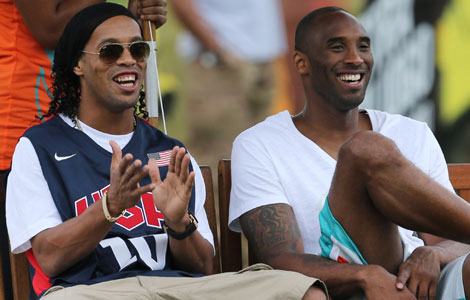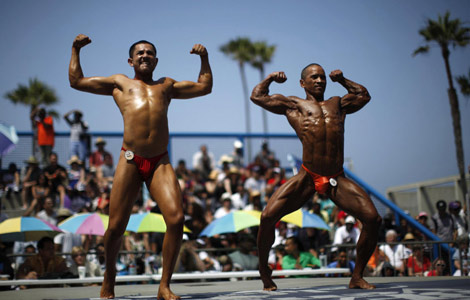Monkey is king in New York City
Updated: 2013-07-05 11:38
By Kelly Chung Dawson in New York (China Daily)
|
||||||||
In the 1970s, a Japanese television show based on Journey to the West, a 16th century Chinese novel about a mischievous monkey and his band of friends, introduced a generation of British children to Chinese culture. That series, Monkey Magic, became a cult classic, captivating young viewers with its wacky mix of martial arts and Eastern morality.
This summer, New York's Lincoln Center brings that story to life in an raucous stage production scored by Damon Albarn of the British pop group Blur; with animations and visual concept by Jamie Hewlett, the animator who, along with Albarn, created the Grammy Award-winning virtual music group Gorillaz. Both men were avid childhood fans of Monkey Magic, Hewlett told China Daily.
Directed by Chen Shizheng, who helmed the first staging of Peony Pavilion at Lincoln Center Festival in 1999, Monkey: Journey to the West at Lincoln Center Festival features martial arts and acrobatics by the Jiangsu Yancheng Acrobatic Company, Chinese vocalists singing in Chinese (with subtitles), and youthful animation sequences reminiscent of the kind that has defined the Gorillaz.
On a journey from China to India in search of sacred scriptures, the monk Tripitaka is accompanied by the Monkey King and two other companions, a pig and a horse. Among the lessons learned are the value of determination, loyalty, bravery and responsibility, according to Lu Wang, who plays the Monkey King. Lu has studied Peking opera for seventeen years, but found Monkey: Journey to the West to be the most creative production he's ever been a part of, he said.
The show first debuted at the Manchester International Festival in England in 2007, then traveled on to Theatre du Chatelet in Paris, the Spoleto Festival USA and the Royal Opera House in London. The Lincoln Center production will run through July 28. The cast has been in the US since the middle of June, rehearsing eight hours a day. For many of the performers, it is their first trip to the US.
"It's the kind of story that appeals to everybody," Hewlett said. "It's a small group of characters who have done stupid things in life and are given the opportunity to redeem themselves and become better individuals. Through their journey they figure out how to solve problems and find happiness. It doesn't matter who you are; we all have the potential to do great things. Everyone's concerned with fame and money and all that rubbish now, so it's a wonderful message."
Hewlett, who won an award for his design of the titles for the BBC's coverage of the 2008 Beijing Olympics, traveled with Albarn multiple times to China while working on the music and aesthetics for the production, visiting Hong Kong, Beijing, Shanghai and a number of other cities. They even climbed Monkey Mountain in Lianyungang. On that same journey, Hewlett saw a shadow puppet show that inspired him with its lovely simplicity, an influence that can be seen in the animation in his show.
Although the Monkey King has frequently been adapted for younger audiences, Monkey: Journey to the West aims for a broader audience. The inclusion of Albarn and Hewlett will appeal to viewers in their 20s and 30s, said Nigel Redden, director of the Lincoln Center Festival.
While there are many ways to be introduced to Chinese culture, he believes it's important for Americans to see Chinese culture in its most modern incarnation, rather than just through viewing dusty bronzes.
Beyond being an exciting story about friendship and loyalty, the tale of the Monkey King is also one of emotional depth, he said.
"It's an adventure story, filled with daring-do and improbable challenges," he said, "but it's also a story - in some ways - about spiritual awakening, and spiritual awakening is important to anyone who has a spirit."
Dong Bourui, who plays Sandy, said that for many Chinese children, the Monkey King is the first story they're ever taught.
"This story has shaped the worldview of Chinese people from generation to generation," he said. "These are the values we teach children in China, and what's important to us."
Chen, who wrote and directed the production, believes that the story of the Monkey King is an ideal entry point for Western audiences into Chinese culture. Chen previously directed Nixon in China at the Theatre du Chatelet in Paris. "This show is representative of what China will be in a hundred years," he said.
(China Daily USA 07/05/2013 page11)

 Kobe Bryant reportedly has highest net worth in NBA
Kobe Bryant reportedly has highest net worth in NBA
 Chinese fleet arrives in Vladivostok for drills
Chinese fleet arrives in Vladivostok for drills
 Joey Chestnut wins 7th contest with 69 dogs
Joey Chestnut wins 7th contest with 69 dogs
 Lisicki, Bartoli to vie for new Wimbledon crown
Lisicki, Bartoli to vie for new Wimbledon crown
 Muscle Beach Independence Day
Muscle Beach Independence Day
 Tough workout for Li Na in war of words
Tough workout for Li Na in war of words
 Submersible taps mineral deposits in S China Sea
Submersible taps mineral deposits in S China Sea
 Ecuador finds spy mic for Assange meeting
Ecuador finds spy mic for Assange meeting
Most Viewed
Editor's Picks

|

|

|

|

|

|
Today's Top News
Missouri govt's veto won't stop Smithfield deal
Canadian potash deal shows trend among Chinese
Asian Americans more upbeat on home finances
Mandela on life support, faces 'impending death'
ROK to discuss Kaesong normalization with DPRK
Gunman shoots two, commits suicide in Texas
Baby formula probe to shake or reshape industry?
Passenger detained over bomb hoax in NE China
US Weekly

|

|






